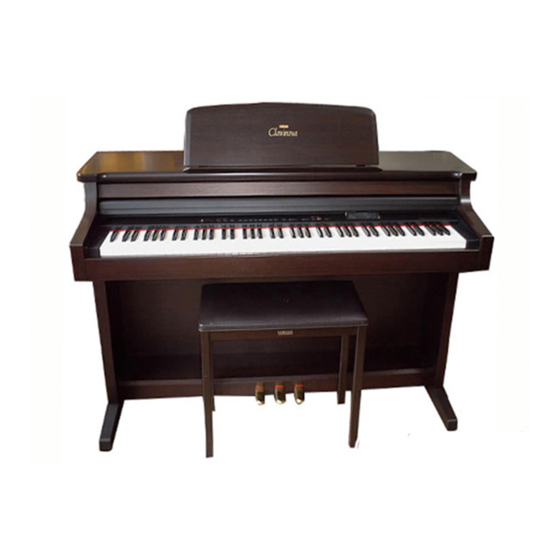Yamaha Clavinova CLP-156 Owner's Manual - Page 12
Browse online or download pdf Owner's Manual for Musical Instrument Yamaha Clavinova CLP-156. Yamaha Clavinova CLP-156 45 pages. Yamaha clp-156: owners manual

Touch Sensitivity
Four different types of keyboard touch sensitivity — HARD, MEDIUM, SOFT or FIXED —
can be selected to match different playing styles and preferences. The different touch sen-
sitivity settings are selected by using the [MIDI/TRANSPOSE] and [REVERB] buttons.
HARD
(ROOM indicator) ...........
MEDIUM
(HALL 1 indicator) ......
SOFT
(HALL 2 indicator) ...........
FIXED
(No indicator lit) ..............
REVERB
ROOM
HALL 1
HALL 2
COSMIC
Memorizing the Touch
Sensitivity Setting
REVERB
ROOM
HALL 1
HALL 2
MIDI/
COSMIC
TRANSPOSE
The Pedals
The CLP-156 has three foot pedals that produce a range of expressive effects similar to
those produced by the pedals on an acoustic piano.
Soft (Left) Pedal
Sostenuto (Center) Pedal
Damper (Right) Pedal
12
The HARD setting requires the keys to be played quite hard to produce maxi-
mum loudness.
The MEDIUM setting produces a fairly "standard" keyboard response. This is
the initial factory default setting.
The SOFT setting allows maximum loudness to be produced with relatively
light key pressure.
All notes are produced at the same volume no matter how hard the keyboard is
played. This is an ideal setting for voices which normally have no keyboard
sensitivity (i.e. harpsichord and organ).
MIDI/
TRANSPOSE
To select a touch sensitivity setting press the [REVERB] button a few times
while holding the [MIDI/TRANSPOSE] button until the indicator correspond-
ing to the desired setting lights.
Press the C7 key while holding the [MIDI/TRANSPOSE] and [REVERB]
button to memorize the current touch sensitivity setting. The memorized setting
will be retained in memory for about one week after the power is turned off,
C
7
then the default setting (MEDIUM) will be restored. To keep the memorized
setting for longer periods, turn the power on briefly at least once a week.
If this setting is not memorized as described above, it is retained in memory
only until the Clavinova is turned off.
Pressing the soft pedal reduces the volume and slightly changes the timbre of
notes played.
If you play a note or chord on the keyboard and press the sostenuto pedal while
the note(s) are held, those notes will be sustained as long as the pedal is held (as if
the damper pedal had been pressed) but all subsequently played notes will not be
sustained. This makes it possible to sustain a chord, for example, while other notes
are played "staccato."
The damper pedal functions in the same way as a damper pedal on an acoustic
piano. When the damper pedal is pressed notes played have a long sustain. When
no REVERB effect is selected and a piano voice is selected, the damper pedal also
produces a special "resonance" that simulates the ring of the strings and the sound
board of an acoustic piano. Releasing the pedal immediately stops (damps) any
sustained notes. The CLP-156 damper pedal additionally features continuous
damping. This allows you to create shorter effects by pressing the damper pedal
down only part of the way.
